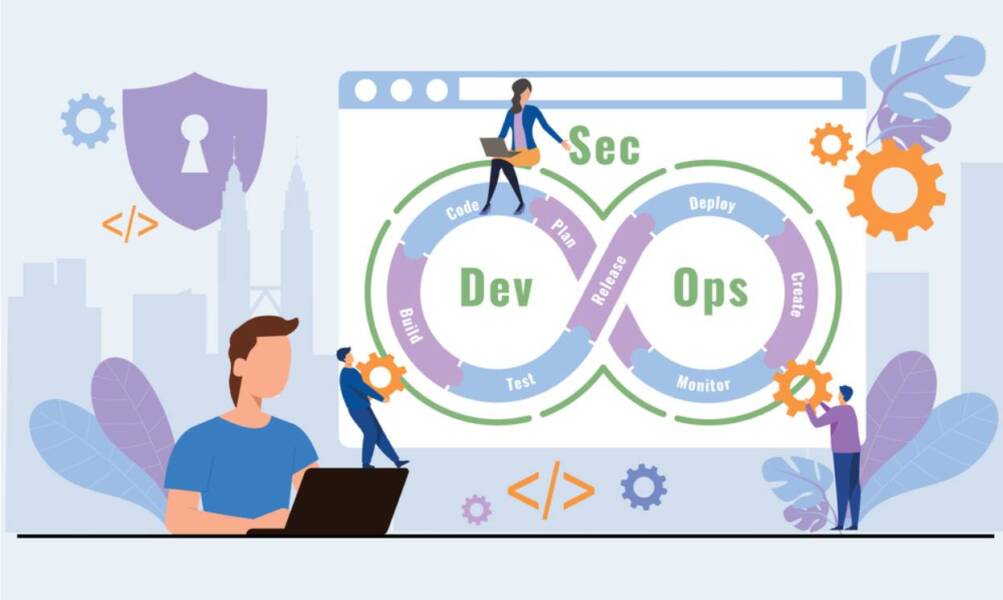The acronym “DevSecOps” refers to the integration of development, security, and operations. It is a strategy that incorporates security as a shared responsibility across the whole of the IT lifecycle. This strategy can be applied to policy, automation, and platform architectures.
To practice DevSecOps is to consider the security of applications and infrastructure from the very beginning of the development process. In addition to this, it entails automating some security checkpoints in order to prevent the DevOps process from becoming sluggish. Choosing the right tools to keep adding security, like coming to an agreement on an integrated development environment with built-in security features, could be a good way to move toward these goals.
Why Do We Need to Adopt DevSecOps?
Speed and increased security are the primary advantages offered by DevSecOps. The code that development teams produce is of higher quality and more secure, not to mention that it is delivered far more quickly.
-
Fast and Affordable Software Installation
When developing software in system that does not support DevSecOps, potential security issues might result in significant delays. It may take a significant amount of time and money to fix the code and the security vulnerabilities. The speedy and secure delivery provided by DevSecOps helps businesses save time and money by avoiding the need to redo a process in order to fix security vulnerabilities that have already occurred.
Because incorporated security eliminates the need for duplicate reviews and wasteful rebuilds, the end product is code that is inherently more secure. This makes the process more time and money effective.
-
Enhanced and More Responsive Security
The DevSecOps solution integrates cybersecurity procedures at an earlier stage in the software development life cycle. During each stage of the software development life cycle, the source code is subjected to several forms of security testing, including reviewing, auditing, scanning, and testing. As soon as these problems are discovered, action is taken to resolve them. Fixes for security flaws are implemented before new requirements are brought into the system. When preventive technologies are found and put in place earlier in the cycle, the costs of fixing security holes are cut down.
In addition, improved coordination between a company’s development, security, and operations teams increases the organization’s ability to react quickly and effectively to incidents and issues as they arise. DevSecOps approaches cut down on the amount of time needed to repair vulnerabilities, which in turn frees up security teams to concentrate on other important tasks. Because of these methods, not only is compliance made sure, but it is also made easier. This means that app development projects don’t have to be changed to make them more secure.
-
Quick security patching
The speed with which newly discovered security flaws are managed is a significant advantage offered by DevSecOps. When vulnerability scanning and patching are included in the release process by DevSecOps, the capacity to find and repair common vulnerabilities and exposures is reduced. This makes it harder for threat actors to take advantage of security holes in systems that are open to the public.
-
High-Tech Automation
If a company uses a continuous integration and delivery chain to roll out its software, then cybersecurity testing could be part of an automation testing suite for that company’s operations teams.
The objectives of the project and the organization are major factors that should be considered before automating any security tests. Automated testing may guarantee that software successfully undergoes the security testing process as well as ensure that all included software requirements are running at the right patch level. In addition, it is able to do code testing and code security using static and dynamic analysis prior to a final update being released to production.
-
A Systematic and Flexible Procedure
As companies become larger, their security measures become more sophisticated. The DevSecOps methodology is well suited for procedures that are both regular and adaptable. This guarantees that the security measures are deployed uniformly throughout the environment, despite the fact that the environment is always changing and adapting to meet new demands.
Conclusion
There is no question that implementing DevSecOps in a business completely changes how security is managed. Still, many businesses are hesitant to switch to DevSecOps for a number of reasons, such as not knowing what it is, not wanting to change their culture, not having enough money, and sometimes just not knowing what the term means.
The financial and technical advantages of deploying DevSecOps in an organization are both significantly beneficial, and firms stand to gain a lot from doing so. Applying DevSecOps can end up being quite profitable for your company in the long term.

Ingrid Maldine is a business writer, editor and management consultant with extensive experience writing and consulting for both start-ups and long established companies. She has ten years management and leadership experience gained at BSkyB in London and Viva Travel Guides in Quito, Ecuador, giving her a depth of insight into innovation in international business. With an MBA from the University of Hull and many years of experience running her own business consultancy, Ingrid’s background allows her to connect with a diverse range of clients, including cutting edge technology and web-based start-ups but also multinationals in need of assistance. Ingrid has played a defining role in shaping organizational strategy for a wide range of different organizations, including for-profit, NGOs and charities. Ingrid has also served on the Board of Directors for the South American Explorers Club in Quito, Ecuador.









































